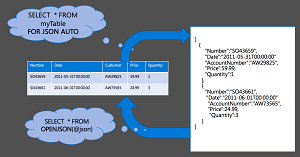How the New JSON Support Will Work in SQL Server 2016
Native support for JSON in the upcoming SQL Server 2016 was buried among the many goodies announced earlier this month for the flagship RDBMS, but it's clearly an important feature for data developers, who this week got more details on the new functionality.
The item titled "Add native support for JSON to SQL Server, a la XML (as in, FOR JSON or FROM OPENJSON)" is the No. 1 requested feature on the Connect site used to garner feature requests for users of SQL Server and Windows Azure SQL Database.
With more than 1,000 votes and leading other items by more than a 140 votes, the item posted more than four years ago reads:
While JSON import and export is possible in SQL Server using horribly complex T-SQL code or CLR integration using the JavaScript JSON methods, such methods are system-resource intensive. It would be nice if MS could integrate JSON into SQL Server the same ways they do XML: say, a FOR JSON clause, an OPENJSON statement, etc.
It may have taken a while, but Microsoft -- as it's increasingly doing on many fronts these days -- has listened and responded to its customers. Microsoft's Jovan Popovic wrote a recent blog post with extensive details about the new support.
For one thing, "native support" doesn't the mean same thing as introducing a new native JSON type, as was done for XML.
As a refresher, JSON -- standing for JavaScript Object Notation -- uses text name/value (or attribute/value) pairs to represent data, serving as a data transmission technology that's easier to read and less complicated than XML.
And, instead of getting its own type like XML, it will be represented by the existing NVARCHAR type, used for representing variable-length strings. Popovic said Microsoft studied the issue and decided to go the NVARCHAR type for many reasons concerning issues such as migration, cross-feature compatibility and client-side support.
"Our goal is to create simpler but still useful framework for processing JSON documents," Popovic said.
Thus the company is focusing on functionality -- such as export/import and prebuilt functions for JSON processing -- and query optimization, rather than storage.
 [Click on image for larger view.]
SQL Server 2016: JSON Support (source: SQL Sentry Inc.)
[Click on image for larger view.]
SQL Server 2016: JSON Support (source: SQL Sentry Inc.)
Not to say that this strategy is set in stone. As I said, Microsoft is really listening to customers these days, and things could change.
"We know that PostgreSQL has a native type and JSONB support, but in this version we want to focus on the other things that are more important (do you want to see SQL Server with native type but without built-in functions that handle JSON -- I don’t think so :) )," Popovic said. "However, we are open for suggestions and if you believe the native type will help, you can create request on connect site so we can discuss it there."
(Some readers didn't even wait to open a Connect item. "This seems like a massively crippled feature and until there is native support I don't believe it offers anything even remotely similar to PostgreSQL," a reader named Phillip wrote in a blog comment.)
Anyway, Popovic explains the nitty-gritty details on the company's initial focus for JSON functionality, detailing how to export JSON with the FOR JSON clause (as was suggested in the original Connect request), how to transform JSON text to relational tables with the OPENJSON function and so on.
"Someone might say -- this will not be fast enough, but we will see," Popovic said. "Built-in JSON parser is the fastest way to process JSON in database layer. You might use CLR type or CLR parsers as external assemblies, but this will not be better than the native code that parses JSON."
Popovic said the JSON functionality will be rolled out over time in the SQL Server 2016 previews. SQL Server 2016 CTP2 is planned to include the ability to format and export data as JSON string, while SQL server 2016 CTP3 is expected to incorporate the ability to load JSON text in tables, extract values from JSON text, index properties in JSON text stored in columns, and more, he said.
The SQL Server team will be publishing more details about the huge new release of SQL Server 2016 as the days count down to the first
public preview, expected this summer.
If you can't wait, those wacky wonks on Hacker News managed to stay somewhat on-topic in a discussion about the new JSON support, and noted database expert Aaron Bertrand goes into really extensive detail in a blog post on the SQL Sentry site.
Posted by David Ramel on 05/19/2015